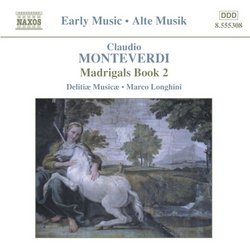| All Artists: Longhini Title: Monteverdi: Madrigals Book 2 Members Wishing: 0 Total Copies: 0 Label: Naxos Original Release Date: 1/1/2003 Re-Release Date: 8/19/2003 Genre: Classical Styles: Opera & Classical Vocal, Historical Periods, Early Music Number of Discs: 1 SwapaCD Credits: 1 UPC: 747313530823 |
Search - Longhini :: Monteverdi: Madrigals Book 2
 | Longhini Monteverdi: Madrigals Book 2 Genre: Classical
|
Larger Image |
CD Details |
CD ReviewsMore 'Delights of Music' From Delitiae Musicae J Scott Morrison | Middlebury VT, USA | 09/08/2003 (5 out of 5 stars) "This is the second volume of what appears to be a series covering all of Monteverdi's madrigals. I was very favorably impressed by the first volume, madrigals published when Monteverdi was only 19. Now, we have Book II, published when Monteverdi was an old man of 22. The musical style has advanced; no longer is the music strophic, but rather the form of the music follows the form of the poetry, often sounding much like what we later came to know in Monteverdi's early operas, a kind of extended (but very melodious) recitative. And, of course, it is highly contrapuntal still; Monteverdi's style became more homophonic as he went along, but here he's still paying obeisance to the contrapuntal late Renaissance/early Baroque style extant in Florence.Most of the lyrics are by Torquato Tasso and mostly they are about love or nature, or both. The familiar two-part 'Non si levav'ancor l'alba novella--E dicea l'una sospirand'allora' depicts the desire of a young couple for the dawn not to come and end their night of delight. The nature poetry of the second part has some of Monteverdi's finest word-painting. As in the first volume the Italian early-music group Delitiae Musicae under Marco Longhini perform brilliantly. The clear-toned all-male vocal group is accompanied lightly and expertly by lute, harpsichord, and in homage to Monteverdi's own instrument, a viola. Recommended.Scott Morrison" Interesting 'Second' Choice Giordano Bruno | Wherever I am, I am. | 12/05/2009 (5 out of 5 stars) "In recording all of Claudio Monteverdi's nine publications of madrigals, "Delitiae Musicae" has thrown itself up against formidable competition, particularly from two other Italian ensembles, "Concerto Italiano" and "La Venexiana", as well as the older performances of the English "Consort of Musick" with Emma Kirkby. I've already reviewed DM's Book 1, heaping praise on it, and Book 3, which I didn't like much. In order to be as fair as possible to this fresh ensemble, I've just spent over an hour matching this CD of Book 2 track-for-track against the recording by Concerto Italiano.
Delitiae Musicae's claim to distinction is that it's an all-male ensemble, with falsettists singing the superius and altus parts. There's no question that the difference can be heard; in fact, the difference in affect is broader than I would have expected, since the women singers of Concerto Italiano employ a very 'white' vocal timbre, as clear as any countertenor's. But part of the difference is attributable to DM's rather 'boyish' energy and exuberance in interpretation. Honestly, I prefer the suave restraint of Concerto Italiano -- the emphasis on modulation and effortlessness -- but then the "guys" etch some of the Monteverdian rhythms, the syncopations and sesquialteras, very brilliantly in acoustic space-time. It might come to how the listener envisions a courtly madrigal-session in 16th C Mantua or Ferrara, as an occasion of silky sophistication or as just a tad Falstaffian. If you need only one set of Monteverdi madrigals, and you want "the best", my recommendation would go to Concerto Italiano or La Venexiana. I've never been able to decide which of those two I prefer as a whole. But Delitiae Musicae offers an amusing alternative, especially for the early Books." |

 Track Listings (21) - Disc #1
Track Listings (21) - Disc #1